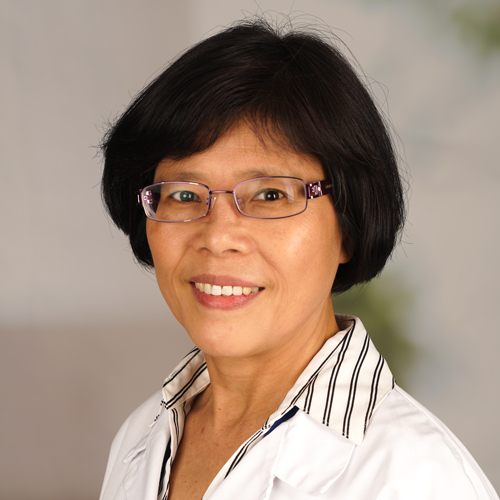Research Interests:
- Identification of genes/pathways that contribute to resistance to anticancer drugs
- Protein-protein interaction
- Targeting immune inhibitory receptors and their ligands as immunotherapies in ovarian cancer
- Familial ovarian cancer
Positions
Roswell Park Comprehensive Cancer Center
- Assistant Professor of Oncology
- Center for Immunotherapy
- Visiting Scientist
- Global Biotechnology & Cancer Therapeutics
Background
Education and Training
- 1990 - PhD - Department of Biological Sciences, Southern Methodist University, Dallas, TX
- 1986 - MSc - Department of Biology, National Taiwan Normal University, Taiwan
Fellowship
- 1995 - Postdoctoral Fellow - Department of Experimental Therapeutics, Roswell Park Comprehensive Cancer Center, Buffalo, NY
- 1990 - Postdoctoral Fellow - Department of Molecular and Cellular Biology, Roswell Park Comprehensive Cancer Center, Buffalo, NY
Professional Memberships
- American Association of Cancer Research (AACR)
Research Overview
Our current research focus is to develop combinatorial blockade strategies to overcome suppressive tumor microenvironment and to enhance T cell’s anti-tumor ability in ovarian cancer. Specifically, we are testing the efficacy of blockade of multiple immune inhibitor receptors, such as PD-1 (program cell death 1), LAG-3 (lymphocyte activation gene 1) and CTLA-4 (cytotoxic T lymphocyte antigen 4) on tumor infiltrating T cells using an orthotopic murine ovarian cancer model. The long term goal is to identify molecular mechanisms by which immune inhibitory receptors collaborate in regulating T cell signaling and function and to utilize these findings in designing better strategies for the treatment of ovarian cancer.
Publications
1. Fidelity of human ovarian cancer patient-derived xenografts in a partially humanized mouse model for preclinical testing of immunotherapies. Odunsi A, McGray AJR, Miliotto A, Zhang Y, Wang J, Abiola A, Eppolito C, Huang RY. J Immunother Cancer. 2020 ;8(2):e001237. PMID: 33177175
2. Oncolytic Maraba virus armed with tumor antigen boosts vaccine priming and reveals diverse therapeutic response patterns when combined with checkpoint blockade in ovarian cancer. McGray AJR, Huang RY, Battaglia S, Eppolito C, Miliotto A, Stephenson KB, Lugade AA, Webster G, Lichty BD, Seshadri M, Kozbor D, Odunsi K. J Immunother Cancer. 2019 Jul 17;7(1):189. PMID: 31315674
3. Neoantigens retention in patient derived xenograft models mediates autologous T cells activation in ovarian cancer. Want MY, Konstorum A, Huang RY, Jain V, Matsueda S, Tsuji T, Lugade A, Odunsi K, Koya R, Battaglia S. Oncoimmunology. 2019;8(6):e1586042.. PMID: 31069153
4. Compensatory upregulation of PD-1, LAG-3, and CTLA-4 limits the efficacy of single-agent checkpoint blockade in metastatic ovarian cancer. Huang RY, Francois A, McGray AR, Miliotto A, Odunsi K. Oncoimmunology. 2016;6(1):e1249561. PMID: 28197366
5. LAG3 and PD1 co-inhibitory molecules collaborate to limit CD8+ T cell signaling and dampen antitumor immunity in a murine ovarian cancer model. Huang RY, Eppolito C, Lele S, Shrikant P, Matsuzaki J, Odunsi K. Oncotarget. 2015;6(29):27359-77. PMID: 26318293
